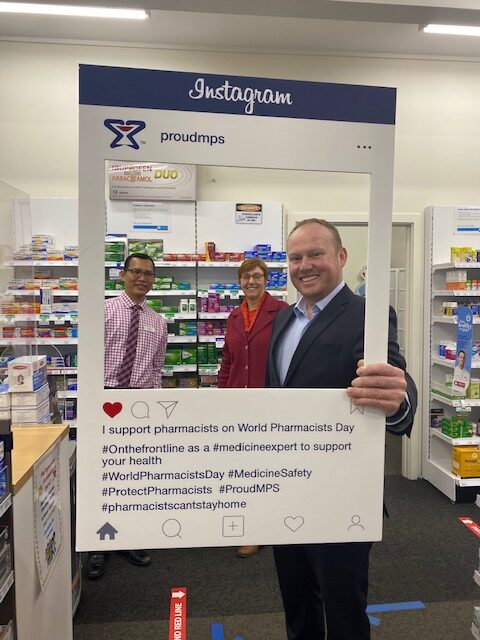Both major political parties in the Australian Capital Territory (ACT) have committed to improving access to vaccinations in the lead-up to the 2020 territory election, where polling closes this Saturday.
Labor commitments:
Liberal commitments:
|
Authorised pharmacists in the ACT can currently vaccinate people against influenza, pertussis, and measles, mumps and rubella.
Writing in response to PSA’s pre-election submission to all political parties, ACT Minister for Health Rachel Stephen-Smith said she was proud of the government’s work in this area, which would continue if Labor was re-elected.

‘We have improved the accessibility of vaccinations by community-based pharmacists, including expanding access to the flu vaccine and allowing the provision of private market measles, mumps and rubella vaccinations,’ she wrote.
‘These changes recognise the expertise and professionalism of our local pharmacists and the importance of increasing access to these life-saving medications.
‘I can confirm that if re-elected, ACT Labor would continue to work with pharmacists to identify opportunities to expand the range of immunisations offered in line with advice from the ACT Chief Health Officer and health experts.’
Meanwhile, Shadow Minister for Health Vicki Dunne said an elected Liberal government would extend access to the free flu vaccine through community pharmacies to all eligible groups under the National Immunisation Program.
‘We will [also] work with the pharmacy community to develop strategies to ensure there are late night and early morning pharmaceutical services in each of our town centres,’ she wrote.
The PSA ACT Branch President Renae Beardmore said ACT pharmacist vaccinators were currently limited in the range of vaccines they could administer, compared to other jurisdictions.
‘Other Australian states, as well as many overseas countries, support greater herd immunity through pharmacist-administered vaccination against diseases such as hepatitis, cholera and polio,’ Ms Beardmore said.
‘Removing restrictions which limit the range of vaccines, and other injectable medicines, that ACT pharmacists can safely administer will increase vaccine coverage in the ACT.’
This would include allowing pharmacists to administer a COVID-19 vaccine when one becomes available.
Other commitments
Both parties also committed to investigating the appointment of the ACT Chief Pharmacist to the ACT Government’s Health Emergency Management Unit Steering Committee, to support planning, preparation and ensure the medical supply chain during emergencies.
‘Pharmacists feel an obligation to assist and are readily available to do so, as demonstrated during the recent bushfire crisis and COVID-19 pandemic,’ Ms Beardmore said.
‘During COVID-19, support to the community has been minimised, indeed impeded at times, by an early lack of involvement and engagement with pharmacists prior to an emergency, at the stage of planning and preparation.’
Ms Stephen-Smith said it would be ‘extremely valuable’ for the Chief Pharmacist to be more closely involved in the planning and management of health emergencies.
This was echoed by Ms Dunne, who said the Canberra Liberals were ‘open to such an action’.
Ms Dunne said a Liberal government would also sign up to the Public Hospital Pharmaceutical Reform, which allows patients to receive a month’s worth of medicines through the Pharmaceutical Benefits Scheme.
The current government had been in ‘discussions with the Commonwealth Department of Health regarding access to such an agreement,’ Ms Stephen-Smith said.
‘If re-elected, ACT Labor will continue to work with Health Minister Greg Hunt to ensure ACT residents have access to any agreement that will improve health outcomes.’
Ms Beardmore said this would bring the ACT in line with other states and territories.
‘Currently, ACT patients receive only 3 to 7 days of medicines at discharge from hospital, which creates a risk of hospital readmission or emergency presentation as patients may not be able to obtain ongoing medicine supply of critical medicines, such as those to prevent blood clots or heart attack,’ Ms Beardmore said.



 John Jones MPS, pharmacist immuniser and owner of My Community Pharmacy Shortland in Newcastle, NSW[/caption]
John Jones MPS, pharmacist immuniser and owner of My Community Pharmacy Shortland in Newcastle, NSW[/caption]


 Debbie Rigby FPS explaining how to correctly use different inhaler devices[/caption]
Debbie Rigby FPS explaining how to correctly use different inhaler devices[/caption]




 Professor Sepehr Shakib[/caption]
Professor Sepehr Shakib[/caption]

 Lee McLennan MPS[/caption]
Lee McLennan MPS[/caption]
 Dr Natalie Soulsby FPS, Adv Prac Pharm[/caption]
Dr Natalie Soulsby FPS, Adv Prac Pharm[/caption]
 Joanne Gross MPS[/caption]
Joanne Gross MPS[/caption]





